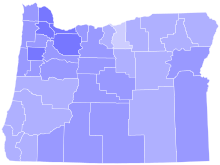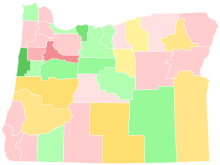2002 Oregon gubernatorial election
| |||||||||||||||||
| |||||||||||||||||
 County results
Kulongoski: 40–50% 50–60% 60–70% | |||||||||||||||||
| |||||||||||||||||
| Elections in Oregon |
|---|
 |
The 2002 Oregon gubernatorial election took place on November 5, 2002. Incumbent Democrat John Kitzhaber was barred by term limits from seeking a third consecutive term; he later successfully ran again in 2010 and 2014. To replace him, former Oregon Supreme Court Associate Justice Ted Kulongoski won a crowded and competitive Democratic primary, while former State Representative Kevin Mannix emerged from an equally competitive Republican primary. The campaign between Kulongoski and Mannix, who were joined by Libertarian nominee Tom Cox, was close and went down to the wire. Ultimately, Kulongoski eked out a narrow margin of victory over Mannix, which was slightly smaller than Cox's total vote share, allowing Kulongoski to win what would be the first of two terms as governor. As of 2024, this is the last time that Oregon voted for a gubernatorial nominee and a U.S. Senate nominee of different political parties.
Democratic primary
[edit]Candidates
[edit]- Ted Kulongoski, former Oregon Supreme Court Associate Justice, former Attorney General of Oregon, nominee for U.S. Senate in 1980, and nominee for governor in 1982
- Jim Hill, former Oregon State Treasurer
- Bev Stein, chair of the Multnomah County Commission
Campaign
[edit]Kulongoski obtained the endorsement of labor unions and the backing of governor Kitzhaber. A poll before the election showed Kulongoski at 40%, ahead of former State Treasurer Jim Hill at 23%, and Bev Stein at 19%.[1] Lesser known candidates standing in the Democratic primary included William Allen, campaigning on the belief that Oregon paid too much money to the federal government and should consider seceding, and Caleb Burns standing to reform Oregon's schools.[2]
Results
[edit]
- 50–55%45–50%40–45%35–40%
| Party | Candidate | Votes | % | |
|---|---|---|---|---|
| Democratic | Ted Kulongoski | 170,799 | 48.21 | |
| Democratic | Jim Hill | 92,294 | 26.05 | |
| Democratic | Bev Stein | 76,517 | 21.60 | |
| Democratic | William Peter Allen | 6,582 | 1.86 | |
| Democratic | Caleb Burns | 4,167 | 1.18 | |
| Democratic | Write-ins | 3,925 | 1.11 | |
| Total votes | 354,284 | 100.00 | ||
Republican primary
[edit]Candidates
[edit]- Kevin Mannix, former Oregon State Representative, 2000 Republican nominee for Attorney General of Oregon
- Jack Roberts, Oregon Commissioner of Labor and Industries
- Ron Saxton, former Chair of the Portland Public Schools Board
- W. Ames Curtright
- Robert Weidner, 1998 Constitution Party nominee for Governor of Oregon
- Lee R. Shindler
Results
[edit]
- 45–50%40–45%35–40%30–35%
- 40–45%35–40%30–35%
- 45–50%40–45%35–40%30–35%
| Party | Candidate | Votes | % | |
|---|---|---|---|---|
| Republican | Kevin Mannix | 117,194 | 35.24 | |
| Republican | Jack Roberts | 98,008 | 29.47 | |
| Republican | Ron Saxton | 93,484 | 28.11 | |
| Republican | W. Ames Curtright | 10,986 | 3.30 | |
| Republican | Roger Weidner | 7,395 | 2.22 | |
| Republican | Lee R. Shindler | 2,266 | 0.68 | |
| Republican | Write-ins | 3,242 | 0.97 | |
| Total votes | 332,575 | 100.00 | ||
General election
[edit]Campaign
[edit]Kulongoski focused on education, his support for gay rights and the Oregon Death with Dignity law. Mannix campaigned on his plans to cut taxes to stimulate the economy of Oregon and encouraging partnerships between businesses and colleges. Tom Cox for the Libertarian party and two write in candidates, Richard Alevizos and Gary Spanovich, also stood in the election.[4]
The departure of Kitzhaber, who had opposed plans to build a Columbia Gorge casino, was considered an opportunity for the Confederated Tribes of Warm Springs.[5] Tribes invested record amounts of money into Oregon politics in this race, including $40,000 supporting Kulongoski.[6] Kulongoski did not take a position on the issue during the campaign, but later became a supporter of the plan.
Kulongoski campaigned using a motor home and his many visits to bowling alleys became a trademark of his campaign.[7] Early in the campaign Kulongoski held a large lead over Mannix in the polls but the gap narrowed as the election neared after Mannix put Kulongoski on the defensive. Mannix characterised Kulongoski as a strong tax and spender after he endorsed a proposed $313 million income tax rise to avoid cuts in education and other areas.[8] He also attacked Kulongoski for being soft on crime.[7] A poll in October showed Kulongoski at 45%, only 4 percent ahead of Mannix at 41%.[8]
Mannix conceded the election on 6 November 2002 after Kulongoski secured a decisive lead in the vote count. The Libertarian candidate Tom Cox claimed that he was responsible for Kulongoski's victory as his exit polls suggested he took twice as many Republican votes as Democratic votes.[9]
Predictions
[edit]| Source | Ranking | As of |
|---|---|---|
| The Cook Political Report[10] | Lean D | October 31, 2002 |
| Sabato's Crystal Ball[11] | Lean D | November 4, 2002 |
Results
[edit]| Party | Candidate | Votes | % | ±% | |
|---|---|---|---|---|---|
| Democratic | Ted Kulongoski | 618,004 | 49.03% | −15.39% | |
| Republican | Kevin Mannix | 581,785 | 46.16% | +16.15% | |
| Libertarian | Tom Cox | 57,760 | 4.58% | +2.77% | |
| Write-ins | 2,948 | 0.23% | |||
| Majority | 36,219 | 2.87% | −31.54% | ||
| Turnout | 1,260,497 | ||||
| Democratic hold | Swing | ||||
Counties that flipped from Democratic to Republican
[edit]- Baker (largest city: Baker City)
- Clackamas (largest city: Lake Oswego)
- Coos (Largest city: Coos Bay)
- Crook (largest city: Prineville)
- Curry (largest city: Brookings)
- Douglas (largest city: Roseburg)
- Deschutes (largest municipality: Bend)
- Grant (largest city: John Day)
- Gilliam (Largest city: Condon)
- Harney (largest city: Burns)
- Jefferson (largest city: Madras)
- Josephine (largest city: Grants Pass)
- Klamath (largest city: Klamath Falls)
- Lake (largest city: Lakeview)
- Linn (largest city: Albany)
- Morrow (Largest city: Boardman)
- Jackson (largest city: Medford)
- Marion (largest city: Salem)
- Polk (largest city: Salem)
- Sherman (largest city: Wasco)
- Umatilla (largest city: Hermiston)
- Union (largest city: La Grande)
- Wallowa (largest city: Enterprise)
- Wasco (largest city: The Dalles)
- Washington (largest city: Hillsboro)
- Wheeler (largest city: Fossil)
- Yamhill (largest city: McMinnville)
References
[edit]- ^ "GOP, Dems See Chance at Oregon Governor's Spot". Fox News Channel. May 18, 2002. Retrieved May 20, 2008.
- ^ "Five 'other' candidates are running". Oregon Daily Emerald. May 9, 2002. Archived from the original on May 27, 2008. Retrieved May 20, 2008.
- ^ a b Content Manager WebDrawer – 2002 Primary Election Official Results
- ^ "Governor race heats up". Oregon Daily Emerald. September 23, 2002. Retrieved May 20, 2008.[permanent dead link]
- ^ Jim Lynch (November 21, 2002). "Silence of Oregon's Governor Elect Adds Fuel to Fight over Casino". Knight Ridder/Tribune Business News. The Oregonian. Archived from the original on October 20, 2012.
- ^ Jim Lynch (January 15, 2003). "Native American Tribes Invest Record Cash in Oregon Politics". Knight Ridder/Tribune Business News. The Oregonian. Archived from the original on October 20, 2012.
- ^ a b Benedetto, Richard (November 11, 2002). "Blue-collar campaign allows lawyer to bowl over challenger". USA Today. Retrieved May 20, 2008.
- ^ a b "Seeming Shoo-In Finds Himself Fighting". Fox News Channel. October 23, 2002. Retrieved May 20, 2008.
- ^ "Mannix concedes in race for governor". Oregon Daily Emerald. November 7, 2002. Archived from the original on July 9, 2007. Retrieved May 21, 2008.
- ^ "Governor Updated October 31, 2002 | The Cook Political Report". The Cook Political Report. October 31, 2002. Archived from the original on December 8, 2002. Retrieved September 18, 2018.
- ^ "Governors Races". www.centerforpolitics.org. November 4, 2002. Archived from the original on December 12, 2002. Retrieved September 18, 2018.
- ^ Content Manager WebDrawer – 2002 General Election Official Results


